Coping with Fatigue Caused by Cancer
Many people experience fatigue during cancer treatment. In fact, exhaustion is one of the most common side effects of treatment. You’ve been tired in the past, but this is a whole new thing. It may be the most intense fatigue you’ve ever experienced, affecting every aspect of your life.
Beyond Tired
Does this sound like you?
You’re hit with waves of exhaustion that come out of nowhere.
Your arms and legs feel heavy and hard to move.
You care less about your appearance than you used to.
You have trouble concentrating.
You feel depressed or irritable.
Your fatigue doesn’t get better with sleep.
The first thing to know is that this is perfectly normal. The next is that you need to respect it. Extreme fatigue is not something you can just work through; in fact, trying to power through it will have the opposite effect and leave you more depleted.
Why Am I So Weary?
Cancer and cancer treatment take a powerful toll on your body and your mind. Both contribute to anemia, a low red blood cell count that depletes your energy and causes shortness of breath. Chemotherapy and radiation treatment affect your eating habits, which may prevent you from getting the nutrients your body needs for fuel. And pain medications can make you feel drowsy and exhausted.
In addition, the stress of cancer affects your emotional well-being, leading to anxiety and depression. These emotions can wear you down and interfere with your ability to sleep through the night. Lack of sleep makes it hard to function. And so the cycle continues.
Ways to Boost Your Energy
You can’t eliminate fatigue, but you can take steps to manage it.
1. Get Your Rest
Be consistent with your sleep habits. Try to go to bed and get up at the same times each day. Take brief naps as needed, but don’t let them take the place of your regular night-time sleep. Create a restful environment in your bedroom, avoiding electronics before bed and limiting light and noise.
2. Stay Nourished
Good nutrition can boost your immune system and minimize the side effects of treatment. If you find it challenging to eat a balanced diet or take in enough nutrients, we can help. Our health coach is available to let you know what your body needs to fight cancer, guide you in choosing the right foods and share nutritious and tasty recipes.
3. Exercise in Moderation
Although exercising may seem like the worst way to counter fatigue, it’s actually one of the best. We’re not talking about exercising to the point of exhaustion. We recommend consistent, simple exercises that build strength and stamina and improve your ability to tolerate treatment. Our chair yoga sessions are a great way to renew your energy and relax your mind.
4. Reduce Stress
In addition to chair yoga, relaxation techniques such as meditation, focused breathing and Reiki can reduce the wear and tear that causes fatigue. These techniques help restore your mind, body and spirit. You can practice them here and continue them at home.
At The Ghosh Center, our commitment to your well-being includes healing therapies and weekly wellness activities. We encourage you to respect what your body is telling you and reserve your energy for the things that matter most. Especially true at the holidays – and important all year long.

